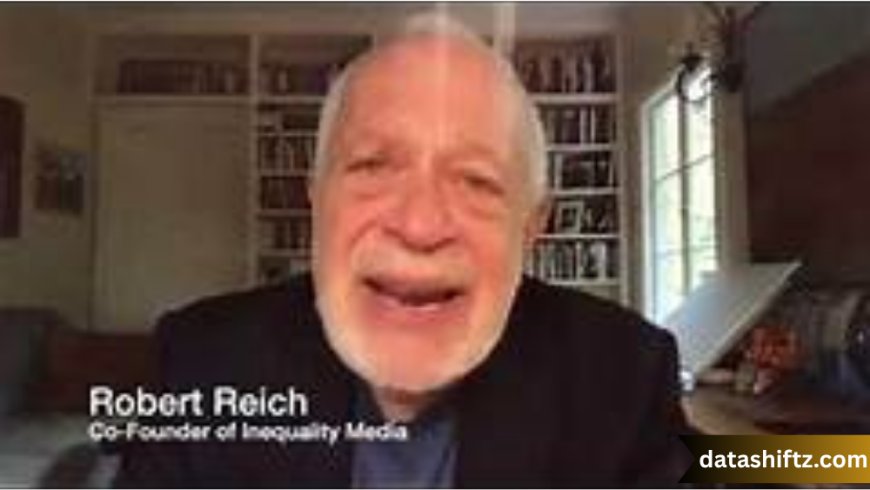Robert Reich: A Voice for Economic Justice and Progressive Policy

Introduction
Robert Reich is a renowned American economist, professor, author, and political commentator who has shaped economic thought and progressive policy in the United States for decades. Known for his ability to explain complex economic principles in accessible language, Reich has become a central figure in debates surrounding income inequality, labor rights, capitalism, and democratic reform.
From serving as Secretary of Labor under President Bill Clinton to producing viral educational videos on economic inequality, Robert Reich has consistently championed policies aimed at reducing inequality and strengthening the middle class. This blog post explores his life, career, economic views, and enduring impact on American political discourse.
Early Life and Education
Robert Bernard Reich was born on June 24, 1946, in Scranton, Pennsylvania. He grew up in a working-class family and was diagnosed with Fairbanks disease (a bone disorder) at an early age. His experiences of vulnerability and bullying shaped his later passion for social justice and equity.
Education Milestones:
| Year | Institution | Degree |
|---|---|---|
| 1968 | Dartmouth College | Bachelor of Arts |
| 1970 | University of Oxford (Rhodes Scholar) | MA in Philosophy, Politics, and Economics |
| 1973 | Yale Law School | Juris Doctor (JD) |
Political Career and Public Service
Robert Reich’s most notable public role was serving as the 22nd U.S. Secretary of Labor under President Bill Clinton from 1993 to 1997. His tenure was marked by significant labor reforms and efforts to address wage stagnation, worker training, and workplace safety.
Key Achievements as Secretary of Labor (List Form)
-
Job Training Programs
Advocated for and helped implement new training initiatives to improve worker skills in a changing economy. -
Minimum Wage Increase
Played a pivotal role in raising the federal minimum wage in 1996. -
Workplace Safety
Strengthened OSHA (Occupational Safety and Health Administration) regulations and enforcement. -
Family and Medical Leave Act Implementation
Oversaw the implementation of the FMLA, giving employees the right to take unpaid, job-protected leave. -
Clinton Economic Team Member
Contributed to broader economic discussions that led to fiscal surpluses and economic growth in the late 1990s.
Despite internal disagreements with the Clinton administration—particularly over NAFTA and welfare reform—Reich left a lasting legacy as a labor advocate and reformist.
Academic and Media Career
After leaving the Clinton administration, Robert Reich returned to academia and the public sphere as a writer and commentator. He has authored numerous best-selling books and appeared in influential documentaries that critique modern capitalism and advocate for progressive reforms.
Academic Positions:
| Year | Institution | Role |
|---|---|---|
| 1997–2004 | Brandeis University | Professor of Social and Economic Policy |
| 2004–Present | University of California, Berkeley | Chancellor's Professor of Public Policy |
Popular Books by Robert Reich (Table Form)
| Title | Year | Focus Area |
|---|---|---|
| The Work of Nations | 1991 | Globalization and labor |
| Locked in the Cabinet | 1997 | Memoir of his time in government |
| Supercapitalism | 2007 | Corporate power and its influence on democracy |
| Aftershock | 2010 | Income inequality post-2008 recession |
| Saving Capitalism | 2015 | Structural economic reform |
| The System: Who Rigged It, How We Fix It | 2020 | Political corruption and reform |
Documentary Films Featuring Reich:
-
Inequality for All (2013) – A Sundance award-winning documentary explaining wealth inequality in the U.S.
-
Saving Capitalism (2017) – A Netflix documentary based on his book exploring how capitalism can work for everyone.
These films have brought economic policy discussions into the mainstream and furthered his influence among younger generations.
Reich’s Economic Philosophy
Reich's economic ideology is grounded in progressive capitalism—a belief that the market system must be regulated to serve the broader public good rather than the narrow interests of the elite. He strongly opposes unfettered capitalism and corporate monopolies.
Core Principles of Reich’s Economic Thought (List Form)
-
Income and Wealth Redistribution
Through progressive taxation, universal healthcare, and strong social safety nets. -
Strengthening Labor Rights
Support for unions, collective bargaining, and worker protections. -
Universal Basic Services
Advocates for publicly funded healthcare, education, and childcare. -
Political Reform
Supports campaign finance reform and anti-corruption legislation to reduce corporate influence. -
Climate Justice
Believes economic justice and environmental sustainability are interconnected.
Criticism and Controversy
Like any influential figure, Robert Reich has faced criticism from across the political spectrum:
Criticisms:
-
Free Market Advocates argue that his proposals stifle innovation and growth.
-
Conservatives often label him a socialist for advocating redistribution policies.
-
Moderate Democrats have sometimes viewed him as too idealistic and uncompromising.
Despite the critiques, Reich continues to enjoy strong support among progressives, activists, and students who value his commitment to fairness and transparency.
Robert Reich on Modern Issues
Robert Reich remains highly active on social media and public platforms. He frequently posts short educational videos and infographics to explain pressing economic issues.
His Stances on Key Issues:
| Issue | Robert Reich’s Position |
|---|---|
| Income Inequality | Must be addressed through systemic reform |
| Universal Healthcare | Strongly supports Medicare for All |
| Student Debt | Advocates for full cancellation and free public college |
| Labor Unions | Essential to counterbalance corporate power |
| Wealth Tax | Endorses a tax on ultra-millionaires and billionaires |
| Climate Change | Supports a Green New Deal |
Impact and Legacy
Robert Reich’s influence extends beyond academia and government. His ability to educate, engage, and inspire has made him one of the most respected progressive voices in the U.S.
List of Contributions:
-
Introduced economic justice to a broader audience through books and films.
-
Helped raise awareness about wealth disparity in the post-Reagan era.
-
Empowered young progressives through accessible education and activism.
-
Provided a consistent critique of corporate influence in politics.
-
Championed reform without compromising on democratic values.
Awards and Honors
| Award | Year | Institution/Organization |
|---|---|---|
| Bruno-Kreisky Social Justice Award | 2003 | Austria |
| Time’s Top 10 Cabinet Members | 1996 | TIME Magazine |
| Honorary Doctorates | — | Dartmouth, Amherst, Hofstra, and others |
Present Day Activities
As of 2025, Robert Reich continues to teach at UC Berkeley, run his non-profit Inequality Media, and speak at global economic forums and universities. His commentary reaches millions every month via platforms like YouTube, Substack, and Twitter/X.
He remains an influential figure within the Democratic Party and the progressive movement, especially among Gen Z and millennials who are seeking structural economic and social change.
Conclusion
Robert Reich stands as a pillar of economic justice and progressive reform in American politics. Whether through government service, academic work, or popular media, he has spent his career advocating for a fairer, more inclusive economy.
In an age of growing inequality, Reich’s voice is more critical than ever. He challenges both political leaders and ordinary citizens to rethink how capitalism can be reshaped to serve everyone—not just the wealthy few. His contributions will likely continue to influence debates on fairness, democracy, and justice for years to come.






























